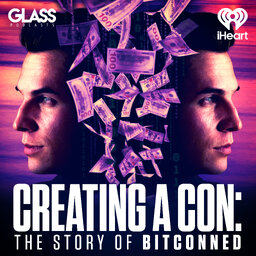The story of Creating a Con: The Story of Bitconned has also been adapted into a Netflix documentary. Bitconned is available NOW, exclusively on Netflix. To learn more about the production, please take a listen to this encore presentation of Netflix's You Cant Make This Up where host Rebecca Lavoie interviews the documentary's director, Bryan Strokel. Be sure to check out the film, Bitconned, exclusively on Netflix and keep listening to Creating a Con: The Story of Bitconned. Enjoy!
At the height of the Bitcoin boom, Ray Trapani and his friends created a debit card for cryptocurrency. Even though the technology didn’t work and the card was a scam, Centra Tech was making millions of dollars a day. But anyone looking at the operation would discover cut-and-paste business plans, fake executives, and glitchy technology. Bitconned lets Trapani tell his story of fun, fame, and fraud as he awaits sentencing for the first high-profile case of the crypto era. Was it real? No. But did it work? Maybe.
In this episode of You Can't Make This Up, host Rebecca Lavoie interviews director Bryan Storkel.
SPOILER ALERT! If you haven't watched Bitconned yet, make sure to add it to your watch-list before listening on.
Listen to more from Netflix Podcasts.
In 1 playlist(s)
Creating a Con: The Story of Bitconned
Creating a Con is a true crime podcast that goes inside the minds of the most prolific modern-day co…Social links
Follow podcast
Recent clips

Introducing: Burden of Guilt Season 2
01:21

Introducing: American Homicide E10 – Who Killed Carol? Part 2
34:27

Introducing: American Homicide EP 9 – Who Killed Carol? Part 1
33:47
 Creating a Con: The Story of Bitconned
Creating a Con: The Story of Bitconned